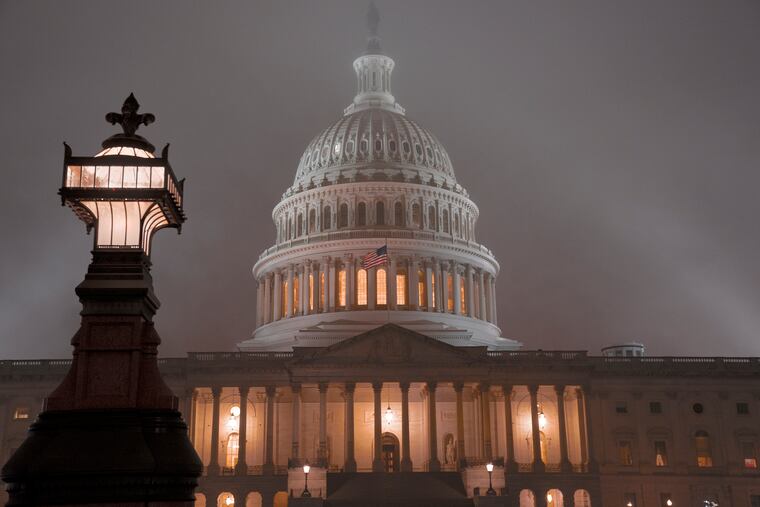Congress finalizes $1.3 trillion spending deal ahead of Friday shutdown deadline
Congressional negotiators cemented a $1.3 trillion federal spending deal Monday, with a pay raise for federal workers, money for federal gun violence research and repeal of several taxes associated with the 2010 health care law.

WASHINGTON - Congressional negotiators cemented a $1.3 trillion federal spending deal Monday, with a pay raise for federal workers, money for federal gun violence research and repeal of several taxes associated with the 2010 health care law.
Congress is expected to pass the legislation this week ahead of Friday's shutdown deadline and send it to President Donald Trump for his signature. Negotiators planned to release a text of the bill later Monday.
A high-profile conflict over border wall spending - the issue that sparked a record 35-day partial government shutdown a year ago - was resolved with a retreat to the status quo: funding remains unchanged from 2019 levels at $1.375 billion, short of the $5 billion Trump requested from Congress.
The Trump administration, however, retains the ability to transfer funds from other accounts, though the bill does not replenish the accounts it drew from earlier this year. Funding for immigration enforcement agencies also remains unchanged from 2019 levels.
The continuation of any border-wall funding is a blow to Democrats, who pushed to halt construction and block Trump from diverting funds appropriated for other projects. Trump repeatedly promised during the 2016 campaign that Mexico - not U.S. taxpayers - would pay for the wall.
But Democrats touted significant wins elsewhere in the bill - including $25 million in funding for federal gun violence research and $425 million in election security grants, as well as a $208 million boost in funding for the Environmental Protection Agency.
Also expected to ride along on the spending legislation is a bill raising the national age for tobacco sales to 21, a reauthorization of the Export-Import Bank of the United States, and a permanent repeal of several Affordable Care Act taxes that have faced bipartisan opposition and have been repeatedly delayed since the act's 2010 passage.
The federal funding for gun violence research is the first in more than 20 years. The 2019 spending agreement clarified a long-standing provision that had been interpreted to prevent funding for that research, but it did not actually provide any funding.
Other Democratic priorities included in the bill are a 3.1% pay raise for civilian federal employees, $7.6 billion in funding for the 2020 Census and record funding for education programs including Head Start.
Republicans highlighted a $22 billion increase in Pentagon funding, which Democrats agreed to over the summer as part of a two-year, $2.7 trillion budget accord that also suspended the federal debt cap for the remainder of Trump's first term.
The new deal fills in the details of agency-by-agency, account-by-account funding pursuant to that broader deal.
Other GOP wins included funding to advance a Republican-supported Veterans Affairs program aimed at privatizing some VA health care delivery, as well as the preservation of several policy restrictions related to abortion and gun rights.
The bill, for instance, does not contain Democratic language overturning Trump administration's move to bar organizations that receive federal family planning grants from referring patients for abortions. It also leaves out increased funding of foreign family planning programs that Republicans have argued encourages abortions.
The release of the bill keeps the House on track for a head-spinning week of action, with the spending deal expected to come to a vote Tuesday, followed by a vote impeaching Trump Wednesday and a Thursday vote on the U.S.-Mexico-Canada trade agreement.
Trump has yet to send a clear signal of support for the spending deal, though Treasury Secretary Steven Mnuchin has played a personal role in shepherding the deal to the finish, meeting with congressional leaders twice last week. Trump, however, initially rejected a tentative 2019 spending deal negotiated on Capitol Hill a year ago, plunging the federal government into the record shutdown.